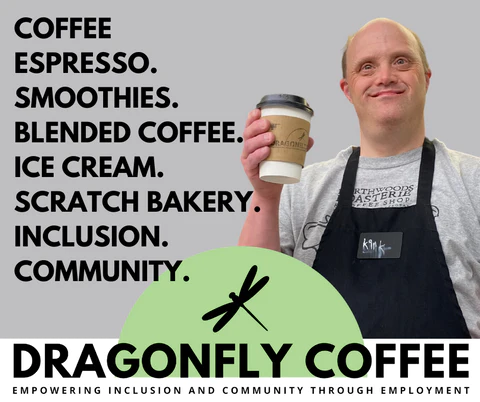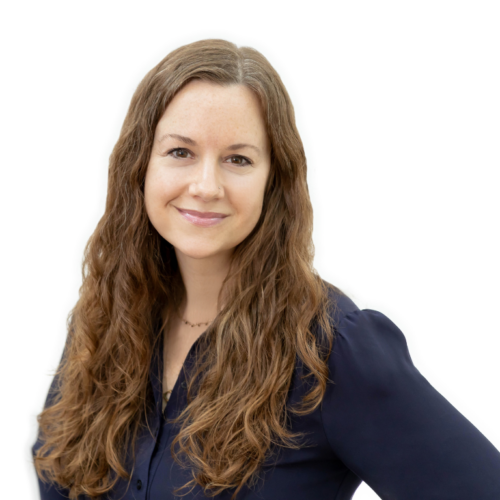Social Enterprise: Lisa Lassen Shares Her Lessons Learned and Hopes for the Future

Over the past few months, I’ve had the pleasure of co-facilitating Propel’s Social Enterprise Accelerator Cohort. As we have progressed through our sessions, I’ve been encouraging our members to focus in on their “why,” the primary goal for their social enterprise: Is it to purely generate additional revenue for the organization? Is it to help the organization reach a new market? It’s been exciting to watch as organizations have clarified their goals and worked together to ask important questions of each other. Our cohort members are working on projects spanning the sector, and include projects like a design studio, home repairs, and a coffee shop.
One of our members agreed to share her wisdom as she starts her second social enterprise. I sat down with Lisa Lassen, the Executive Director of Itasca Life Options, who recently opened a second social enterprise called Dragonfly Coffee – a coffee shop and bakery in the Central Square Mall in Grand Rapids, MN, and discussed the importance of mission, how their newest social enterprise is going, and the lessons they are learning along the way.
Leah: Can you tell me a little bit more about each of your social enterprises?
Lisa: Our social enterprise Crafted started six years ago, and we honestly didn’t know it was a social enterprise – we were seeking activities for day programming for people with disabilities, and it grew quickly. Clients can come in Monday – Friday and work on their own art in any genre. Staff can help if they need physical assistance. The space, like the coffee shop, is in the Central Square Mall so it is integrated into the community, and it is accessible. Our clients get commission on the pieces they sell at a 60/40 split. The success of that program really inspired us to think about other ways to get people working in and with the community.
So, when the opportunity presented itself, we took over another space in the mall that announced they were closing, and we opened Dragonfly Coffee.in 2022. It provides our clients with vocational training and experience all while providing exceptional coffee, baked goods, and ice cream. That’s what we are working on in the Social Enterprise Cohort, is how we can make this sustainable for the long haul.
Leah: What made you want to start another social enterprise? How did the idea come about?
Lisa: The mall cupcake shop announced it was closing on Facebook. I reached out to the owner to see if she would consider selling her equipment to us. It was a good deal for her because then she didn’t have to do a lot to close her business.
And, importantly, the board has been very supportive. It was another step to empower people with disabilities and a way to support people who might need more time learning skills – this would be a great way to give those folks a new opportunity and more time for training and then move them out to the community.
Leah: How are things going?
Lisa: I can answer that in so many ways. First, we have seen some really cool situations where people who you’d think couldn’t do certain things – like running a cash register or washing dishes – are doing really great. One of our clients has Down Syndrome and is nonverbal; after he did his first shift at Dragonfly, he did a huge fist pump. It was the best, and it is why we’re doing this even though it’s super hard and there are so many things we didn’t know.
Second, the customers have been great, and things are going as well as they could. Of course, with the seasons changing, Grand Rapids sees fewer folks visiting the mall in the winter, so we expect things might slow down a little bit. We are getting orders from more people around town and are working out how to do more partnerships.
Leah: I am hearing your “why” emerge, as we talk about in the cohort, and it sounds to me like it is all connected to ILO’s mission?
Lisa: Yes. Absolutely. I previously worked in the field of disabilities and knew that people needed more opportunities for meaningful and accessible work. Times have changed, we’re not doing the status quo, we need to offer more, and people need to have opportunities and believe that people can do something instead of believing they can’t.
My goal with this social enterprise is to focus on community integration and inclusivity. With that in mind, we are trying to make a space where people can work together in the community. Previously, no one knew who we were or didn’t know our spaces but now they do because they are in places they already go – people like what we do and want to support organizations like ours.
Leah: What are you applying from your first experience to this one? What is different?
Lisa: Marketing. When I think about Crafted, our biggest challenge was to let people know who we were and that we were there. We’re really focusing on getting the word out and letting the community know what’s going on. We have great partnerships established, and we are relying on those, too.
Because this business is open at different hours, and there needs to be special training, we are still working on figuring out the right budgets, costs, staffing, inventory, etc. We are also filling some needs in the community. We are now the only scratch-made bakery in town, and recently filled an order for 27 dozen cookies for the school!
Leah: What advice would you give other organizations thinking of starting a social enterprise?
Lisa: Be mission focused. That’s the “why” that drives everything. For us, that was a huge thing because it directly fuels our mission, so that’s what keeps us going.
My other two pieces of advice would be:
- Make a business plan, figure out the real numbers of the budget. You will go over budget, like we did, so there should be plans for that.
- Be confident. Stick with it and don’t give up. I had confidence in this program, and I think that is something that helps keep it going.
Leah: What’s the best part of Dragonfly so far?
Lisa: As I mentioned, getting to see how much our clients are enjoying working there. And, they are the best spokespeople. The photos and promos that include them always get the most likes, comments, and reactions.
I also love to see how we are increasing awareness among other businesses. We are an example that they can employ people with disabilities, and we are looking forward to more employers stepping up to want to work with us to hire people with disabilities as their employees.
The mission of Itasca Life Options is to empower and provide opportunities to people of all abilities.
This conversation was edited for brevity.

